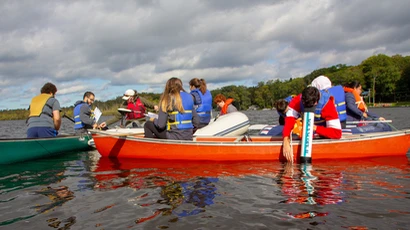
Dr. Lelito and Dr. Moskalik Return to Give Presentations
Alumni present stories of voracious beetles and cannibalistic spiders
October was an appropriate month for alumni Jonathan Lelito and Brian Moskalik to return to the Biology department and share stories of their research involving alien beetles laying waste to acres of forests and female spiders that cannibalize their mates.
Jonathan Lelito graduated with his bachelor’s and master’s degree in Biology from Fredonia in 2003 and 2006, respectively. He went on to Penn State and earned his PhD in Biology at Pennsylvania State University. He is currently a Facility Manager for the United States Department of Agriculture Animal and Plant Inspection Service Plant Health, Plant Protection and Quarantine.
Dr. Lelito’s primary area of research interest is the Emerald Ash Borer, a highly invasive and introduced beetle that has killed nearly 30 million ash trees in the United States. The economic impact is severe, with losses estimated in the tens of millions of dollars.
His presentation was entitled: Emerald Ash Borer – How to Trap a Pest: Mate-finding, visual cues, and host volatiles allow the detection and monitoring of the emerald ash borer in North America
Presentation Abstract: The emerald ash borer, Agrilus planipennis, an invasive pest and serious threat to the nation’s ash tree resource, has a fascinating mate-finding behavior. A series of experiments demonstrates that the beetle uses visual cues to locate potential mates on host foliage, upon which a stereotyped mating attempt occurs. Male beetles perform this behavior to both male and female conspecifics, but female conspecifics elicit a much longer duration of attention by the male. Host volatiles from injured ash trees can enhance trap catch and can increase efficacy of traps based on visual lures, but the visual lure alone is quite efficient. Additionally, male beetles in the genus Agrilus native to North America demonstrate a strikingly similar suite of behaviors. Male Agrilus beetles can be duped into a copulation attempt with non-buprestid objects, such as tiger beetle elytra, and can even be fooled into persisting in their mating attempts if these false lures are coated with female cuticular compounds. This evidence indicates that both the natives and the invasive buprestid studied use host volatiles to locate host plants under attack, and then locate conspecifics on the host using visual cues. It is hoped that this information will result in the development of increasingly effective ways to trap the Emerald Ash Borer and reduce the rate of destruction of ash trees in the United States and Canada.
Brian Moskalik graduated with his bachelor’s and master’s degree in Biology from Fredonia in 2003 and 2006, respectively. He earned his PhD in Biology at the University of Cincinnati.
Dr. Moskalik is currently an Andrew W. Mellon Postdoctoral Fellow in the Department of Biology at the College of Holy Cross. His primary area of research interest is the wolf spider; his research presentation was entitled Female Condition and Mate Choice in a Wolf Spider.
Presentation Abstract: Food limitation is a major component of spider life history and has been used as an explanation for the great diversity of forms and behaviors they exhibit. Yet, much behavioral research has only focused on the relationship between food limitation and cannibalism rates, especially cannibalism during courtship and mating (termed sexual cannibalism). Newly emerging research on a variety of animal taxa has provided evidence that hunger may also alter a female’s preference for specific male secondary traits and thus could potentially change the composition of male trait expression in future generations. With this, the goal of our study was to apply this new information regarding female hunger state to a complex mating system that offers relatively low rates of sexual cannibalism (<30%). We used the well-studied wolf spider, Scizocosa ocreata, and examined if varied female diets alter preference for male characteristics and impact male courtship when hungry females are present. Results suggest that feeding history is a complex life history trait and when altered can potentially influence the evolution of male phenotypes and behavior.

